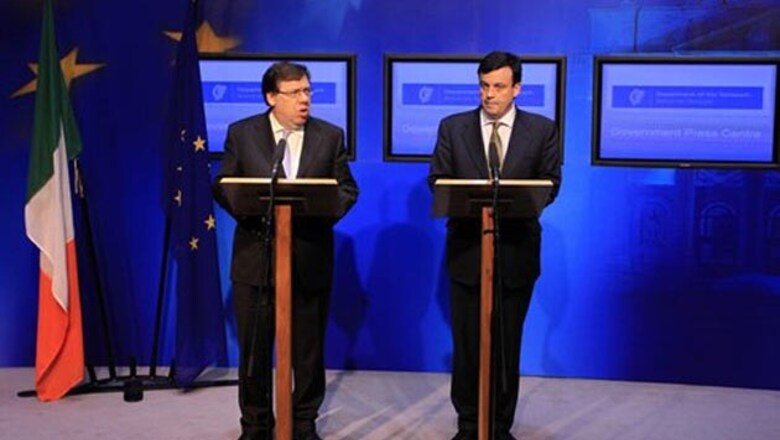
views
Dublin: European and IMF officials will start thrashing out the details of a three-year bailout package for Ireland on Monday while the government puts the finishing touches to a 15 billion euro ($ 20.5 billion) austerity plan.
The EU and the IMF agreed on Sunday to help bail out Ireland with loans -- expected to total 80 to 90 billion euros -- to tackle its banking and budget crisis.
Officials hope the move will stabilize financial markets that have been selling Irish debt and prevent them losing confidence in other euro zone members, notably Portugal and Spain.
Ireland's government, facing public anger over its handling of the crisis, announced plans last month for a package of cuts and tax increases aimed at bringing down a record budget deficit. But its borrowing costs continued to soar, making a bailout almost inevitable.
A four-year fiscal austerity package is expected to contain plans for a new property tax, as well as cuts to benefits and services. Tax breaks for higher earners may also go.
Irish Tourism Minister Mary Hanafin told RTE television the four-year plan had been finalized but had to be cleared by Europe and the IMF and would be published on Wednesday.
A plan to restructure Ireland's banks is being devised as a central plank of the broader international aid package.
Finance Minister Brian Lenihan told a news conference on Sunday that Irish banks would become significantly smaller than they had been and that they may look at selling non-core assets.
The size of the rescue by the EU and the International Monetary Fund has yet to be negotiated but is likely to be smaller than Greece's 110 billion euro ($ 150 billion) bailout last May.
EU Economic and Monetary Affairs Commissioner Olli Rehn said experts from the European Commission, European Central Bank and IMF would prepare a three-year package of loans by the end of the month.
Britain, which is not part of the euro zone, said it would offer about 7 billion pounds ($ 11.19 billion) in bilateral aid.
EU policymakers have feared that Ireland's problems might spread to other euro zone members with large budget deficits such as Spain and Portugal, threatening a systemic crisis.
In Berlin, German Finance Minister Wolfgang Schaeuble played down this risk. "If we now find the right answer to the Irish problem, then the chances are great that there will be no contagion effects," he told ZDF television.
Some economists were less optimistic.
"I think it means Portugal is next (to request help). I don't know if it will happen before the end of the year or after, but it's almost inevitable now," said Filipe Garcia at Informacao de Mercados Financeiros in Porto.




















Comments
0 comment